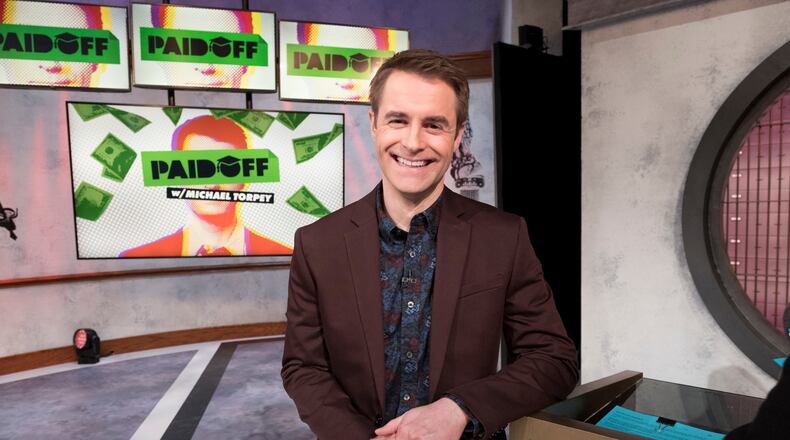Originally posted Monday, July 9, 2018 by RODNEY HO/rho@ajc.com on his AJC Radio & TV Talk blog
From “Let’s Make a Deal” to “Wheel of Fortune,” game shows are all about pocketing cash and maybe winning a vacation to the Bahamas.
But actor Michael Torpey's new truTV game show "Paid Off" has a higher purpose: helping out contestants who are burdened with tens of thousands of dollars of student loan debt. The deliberately silly quiz show debuts Tuesday, July 10 at 10 p.m.
During a taping of the show at Turner Studios in Midtown in March, Torpey - who is the host - explained the concept to the audience and how each contestant is financially saddled with student debt. “They will share their stories,” he said. “We need you to support them and cheer them on.”
Later, he added, “Laugh when we say something funny. Connect with the people when they say something real. We give away some money and have a good time. Thank you for supporting us!”
In an interview after taping, Torpey said, “we wanted to find contestants who were doing all the right things but were still struggling to make progress on these debts.”
One contestant named Chris said he received a liberal arts degree and still has $19,630 in debt. “That means I’m basically above average in bar trivia and that’s it,” he cracked.
Leslie Goldman, senior vice president for original programming and development for truTV, believes the show will resonate with the network's target demo of viewers in their 20s and 30s, many who could easily qualify to compete on "Paid Off."
“It speaks directly to our audience,” Goldman said. “This debt is holding people back. It’s keeping them from buying homes, getting married, having kids.”
The trivia questions are sometimes borderline juvenile, a clear homage to MTV’s early era game show “Remote Control.” For instance, the contestants had to identify photos of famous dictators that also happened to have doodles of a penis on them.
“ ‘Remote Control’ was a touchstone for multiple people on this show,” Torpey said. “I loved the sensibility, the spirit and energy of that show. We wanted to bring that same magic.”
Indeed, like “Remote Control,” actors will pop up in ridiculous outfits to pose questions. In this episode, a dude in a shiny silver outfit shows up “from the future” while inexplicably lugging around an old-school fax machine.
Despite the silliness, Torpey said he felt spent after taping. “I’m so wrapped up in their stories. I want everyone to win so badly. It was a bigger emotional toll than I had anticipated.”
Torpey is an actor who had his first big break doing Hanes commercials with Michael Jordan in 2011 and has small roles on shows ranging from "Orange is the New Black" to "Sneaky Pete." He said he was lucky enough to leave college debt free, but his wife psychotherapist Alpana Choudhury carried $40,000 in student debt.
When she wrote her final check to pay it off, Torpey saw how emotional she got. “It was like this invisible burden had been lifted, something that influenced every decision in her life,” he said.
Over 16 episodes season one, the show gave away close to $500,000 with one contestant winning $60,000. Even the third-place contestant gets $1,000.
“We wanted it to be a fun party atmosphere,” Goldman said, “There’s a camaraderie among contestants you don’t necessarily see on other game shows. Everyone is in the same boat. They all have this debt.”
The student loan crisis is not as deadly or insidious as the opioid crisis, but it still affects millions of people. Federal student loans can’t be erased in bankruptcy. It can potentially follow you to your grave.
Student debt affects more than 44 million people with 16 million owing $25,000 or more, according to data compiled last year by the Federal Reserve Bank of New York. The amount of total student loan debt has nearly tripled domestically in the past decade to about $1.5 trillion.
That’s more than auto loan debt ($1.1 trillion) and credit card debt ($977 billion).
Torpey consulted with Natalia Abrams, executive director of Student Debt Crisis, which advocates for student loan debt reform. "She was invaluable helping me craft the message and hit the right topics," he said.
“I’m not a policy wonk,” he added. “I don’t know the best way to fix it. My goal is raise awareness and help a small number of people out and put faces to the crisis.”
About the Author
Keep Reading
The Latest
Featured





